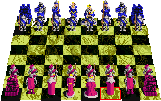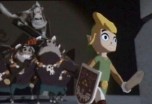A while back, an essay by Robert Abbott titled
Video Games Are Incredibly Stupid! made the rounds. (Parts of today's entry won't make sense unless you have read his original essay.) It was a strident argument against modern video gaming. It provoked many responses including mine, which he reprinted under the "mixed responses" category. I've added a few screenshots just for fun.
 |
| mario kart, multiplayer fun |
As I'm sure many people have pointed out, you paint with a
very broad brush when it comes to videogames. I speak as a gamer who has collected "classic" games for a long while, but mostly enjoys modern multi-player games, with 4 people dueling on screen at once.
Classic Games are interesting to me in the way they had to create microcosms from scratch; thus, there was some more flexibility in the worlds they gave the player to interact with, along with fewer expectations about how good things needed to look (one programmer could do all the code, the sound effects, and the art). Some of this has been lost as games have grown in complexity, but I think your view of modern video games is very limited. You mistake some of the dominant trends for the whole thing. Yes, 90% of modern games are derivative crap, but that's been true through many eras of gaming. Do you know how many Space Invaders and Pac Man clones there were? No, because they've properly fallen into the historical dustbin, of interest only to fans of the history of the field. (Actually, it's probably more like 95% of games are derivative, and half of those are crap, and the other half provides decent experiences for fans of the genre.)
 |
| battle chess |
Picking on Battle Chess seems a little silly. It wasn't very realistic at all (little in that era of games was); in fact, the little "piece takes piece" animations were modeled after some of those same "silent comedies" you later so freely praise! It was broad, physical comedy. At one point I went through and ran all 8x8 "Piece X takes Piece Y" combos to see them all, but still I don't think it was a "quest for realism" that brought this game to market.
As for the "In fact, to this day no one has made a movie as funny as the silent comedies," I don't know if I agree. I think the audience reactions you describe have as much to do with audiences of the era than with the content itself. I haven't watched many silent films, but it has been my experience that some of the comedies from the period right after in a similar physical style (Marx Brothers, Three Stooges) aren't laugh out loud funny for modern viewers.
 |
| robotron: too much for 3D? |
I don't think striving for realism is as negative thing as you do. (Though I've read where Eugene Jarvis shares your opinion about 2D-ish overhead views vs more limited first person perspectives. Robotron would be a pretty tough game, or have far fewer enemies, if he had to give it the first person perspective.) For one thing, it's not pure realism people crave in general, but detail--they want to play a Space Marine or drive a car REALLY fast or Kung Fu Fight, not be a clerk or be stuck in a traffic jam or wander a mall. Having games get closer to what it might "really" look like, rather than depending on the iconic representations that were all the classics could muster, is an interesting and worthy goal for gaming in and of itself.
 |
| the new zelda, aka 'celda' |
Also, the quest for realism isn't the only force in the industry, though it is an important current source of conflict. Notably, Nintendo is bucking the trend...and sometimes being mislabeled as a "kiddy game" company because of it. One of the most notable examples of this is the upcoming installment of "Legend of Zelda." The earliest samples showed a very realistic looking combat, but it seems Miyamato is looking to buck the trend, and later movies of the work in progress show a
very cartoony look. Many fans were horrified (mostly the teenage boy brigade that you like to pick on) but--and this is my main point--there is more to modern videogameing than these boys and the games that cater to them.
You might think that Miyamato is the exception that proves the rule...after all, he's an old-schooler himself, having made games starting with Donkey Kong and moving into the future...but many game houses are experimenting with looks and styles other than "as realistic as possible." There's an interesting trend using "Cel Shading" that provides some very interesting new looks. Still 3D, but more animation-inspired. And even old school game style and variety is making a comeback in "party games" such as "Mario Party" or "Fuzion Frenzy," that bundle many small and unique classic style games in a single graphical and gaming context.
So in short, while I somewhat agree with some of your opinions about industry trends, I don't think you've looked deeply enough at the trends you disparage, or to see what else is going with video games.
--Kirk Israel




